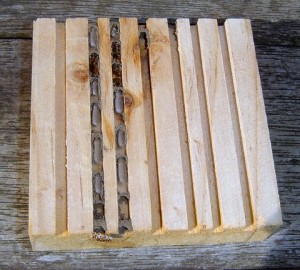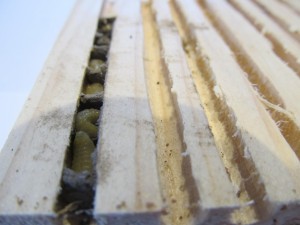These beneficial solitary bees/wasps are not aggressive and do not sting!
These cocoons are of the native mason wasp Pison spinolae. Actually sometimes the insect is referred to as the mason bee, but the females store paralyzed spiders in their cells and not nectar and pollen, so using the term`bee’ is incorrect. Ancistrocerus gazelle will help control all pest leafroller caterpillar species making it a great gardeners companion! Reducing the use of insecticides on your fruit trees and berry bushes.
Ancistrocerus gazelle will help control all pest leafroller caterpillar species making it a great gardeners companion! Reducing the use of insecticides on your fruit trees and berry bushes.

 Leaf-roller Caterpillars stored between the mud walls. Leaf-roller Caterpillar on leaf.
Leaf-roller Caterpillars stored between the mud walls. Leaf-roller Caterpillar on leaf.
 Ancistrocerus gazelle Capping of nesting tunnel with mud.
Ancistrocerus gazelle Capping of nesting tunnel with mud.
It’s great to see other beneficial insects nesting in our leafcutter and solitary bee houses.
